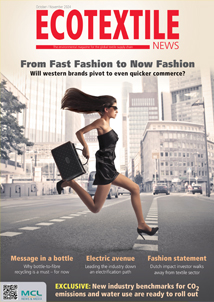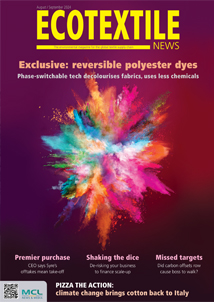WAKEFIELD – Following today’s timely announcement around deforestation at COP26, the second episode in this new five-part audio documentary on textile-to-textile recycling delves into how the ‘OnceMore’ process from Södra uses post-consumer textile waste to make man-made cellulosic textile fibres – rather than just using 100 per cent wood.
Ecotextile Talks speaks to Södra’s Johannes Bogren and Helena Claesson about the ‘magic’ behind its proprietary recycling process, and we also hear from Umar Chowdhury at Sateri, who already uses OnceMore, Sonja Zak at Lenzing, which is currently trialling this pulp to make branded Refibra Tencel, Karla Magruder at Accelerating Circularity along with Nicole Rycroft at the NGO Canopy.
Reporting from a manufacturing facility in southern Sweden, close to the Baltic Sea, which has been converted from making paper pulp to making the dissolving pulp used to produce Tencel and lyocell fibres, Johannes Bogren tells us: “In the pulp and paper business, more than half of our raw materials actually comes from recycled sources … but when we entered the textile business, virtually nothing was recycled.”
Given that the key raw ingredient of both wood pulp and cotton textiles was essentially the same chemical compound – cellulose – Södra found that when this molecule was isolated and purified from textiles in the same way as it can be from wood – the two sources of cellulose could be combined, and the resultant pulp supplied to the textile fibre sector as a ‘drop-in product’.
“When it comes to sustainability, post-consumer (waste) is definitely the most desirable from industry stakeholders,” notes Umar Chowdhury, sustainability manager at Asian viscose fibre supplier Sateri, which already buys dissolving pulp from Södra. “Using post-consumer waste really hits the circularity problem at its core.”
Lenzing, which currently uses pre-consumer waste in its Refibra Tencel fibre is also looking very closely at the ‘OnceMore’ process to help to it close the textile-to-textile loop. But will there be quality issues? “It’s just as good as pre-consumer (waste), there will not be a difference,” says Sonia Zac, Lenzing’s head of circularity. “The consumer will not see any difference or feel any difference and the (yarn) spinner will not see any difference either compared to switching to other fibre types.”
Accelerating Circularity’s Karla Magruder and Nicole Rycroft, founder of the environmental non-profit Canopy also appear in this episode which precedes episode 3 of this new series – that will detail the challenges around sorting and textile waste collection.
This next episode will be released later this week.
Subscribe to our podcasts and radio shows by following us on Apple, Google, Spotify and Amazon Music, to automatically get alerts when we launch a new Ecotextile Talks Behind the News podcast.








































